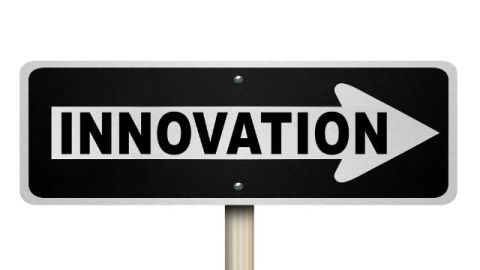The Proverbial Skeptic’s 5 Buzzwords to Stop Using in 2014

No matter how many times I write a post attacking an old adage, or a seemingly wise aphorism, or a grammatically or morally wrong modern usage, I never run out of material to be proverbially skeptical about. (read: wordy and curmudgeonly)
Why? Because, of course, of corporate buzzwords.
There is a scene in an old episode of The Simpsons from 1997 which depicts a corporate meeting held to create a new cartoon character (Poochie, who ends up being voiced by Homer). The executives in the meeting keep throwing out buzzwords until a writer, clearly fed up that the conversation is going nowhere, interrupts to say “Excuse me, but ‘proactive’ and ‘paradigm’? Aren’t these just buzzwords that dumb people use to sound important? Not that I’m accusing you of anything like that. I’m fired, aren’t I?”
But that was 1997. It’s a new year, and it’s also National Hangover Day, so, as The Proverbial Skeptic, it is only right for me to suggest some resolutions. People don’t say “paradigm” or “proactive” or the all-time classic, “synergy”, anymore. But, they do say these words, which I not-so-humbly suggest we all resolve to kick out of our culture in 2014:
1) Innovation/Innovate
This word has become ubiquitous in 2013, which is too bad because it doesn’t mean anything useful. It’s closely related to the “entrepreneur” of the previous few years, but it’s even more vapid. There are two main things wrong with it, besides that it is unnecessarily bandied about by people who want to seem technical and forward-thinking.
For one, it’s not a universal good to innovate, even in the corporate world. Sure, businesses like Apple and 3M and whatever it is Elon Musk is doing this week (wearable solar panels to power mach-5 electric blimps?) rely on the release of a steady stream of new products and services to stay profitable and competitive. But, plenty of businesses simply need to make a quality product that fills a market niche and that stays abreast of current technology and then to just keep up the good work (Viking Ovens, my local bagel shop).
Also, and this is the big one, the term is just overused. Look at the sheer amount of recent books with the word innovation in their titles on Amazon. And the breadth with which people use it renders it completely meaningless.
Every time any minor thing changes, at a big corporation or anywhere else, it isn’t necessarily “innovative”, it’s just different.
These are all good reasons to stop using “innovative” all the time. Plus, it’s annoying.
2) Fail
I have a very funny cousin who works in finance in Silicon Valley. Through him, I hear all of the fad-iest and silliest yuppie buzzwords early. But even being used to this, I still didn’t believe him the first time I heard that swaths of the more “innovative” types in the tech world had started signing off their emails with “Fail fast, fail often”.
But despite my incredulity, 2013 nevertheless saw the rise of “failing” as a lionized and touted activity. There is even a whole book about it. I don’t mean to say that there is nothing at all in the idea that experimentation is useful and that people should not be considered unhireable or untrustworthy if they have overseen a daring but failed enterprise. Experimentation and trial and error are the most inveterate methods for figuring things out and improving things, and they have been since the enlightenment or before. That’s why it’s just so damn smug and irritating how counter-intuitive and tolerant and modern people who say this think they are being.
3) Guru
Everyone’s a guru these days.
This Forbes article even blithely uses the phrase “professors, CEOs and other gurus” as if it is obvious that anybody who talks about anything with even a modicum of self-ascribed expertise meets the definition of the term. We, or at least I, take this pretty much for granted at this point, but it’s a new trend and it’s odd. “Guru” is the Sanskrit word for teacher or master, and it has long been used for Eastern spiritual leaders with followers, and there is no reason to adopt it in “The West” to describe anyone who hopes one day to give a TED talk.
4) Disruption
“Disruption”, a lot like “innovation”, has become ubiquitous in the business world, which seems to have somehow just discovered this year that change equals good equals profit.
I would love to give some great cringe-worthy examples of its use, and to take it apart and to explain why it has come to be a harmful rather than helpful. But, unfortunately for me and fortunately for you, this Slate article called Disrupting Disruption, by the always-insightful Matthew Yglesias, has already done so as well as I could possibly hope to. I urge you to read it.
5) Mindfulness
If there is subject about which you can sell people self-help services, you can bet there is a somebody trying to be mindful about it. I’ve been hearing it more and more this past year, less and less in the context of a specific type of Buddhist meditation (which I happen to like quite a bit). The problem with the way people have started saying “mindful” it is that is just smuggles in whatever it is the speaker already believes, but under the auspices of the methods of an ancient wisdom-tradition.
Let me explain further, because I don’t want to seem like I’m opposed to awareness or thoughtfulness: When I was a freshman studying philosophy in college, I committed a common error in an ethics paper, which was to use the phrase “right-thinking”. It was something along the lines of “what is moral is what all right-thinking people would do if they considered the consequences of their actions as if everybody would act as they did.” What is so wrong with this, my professor reprimanded me, is that “right-thinking” nearly always means, in context, “agrees with me”. It simply smuggles in my predetermined opinion, rather than actually explaining and justifying it. People have started using “mindful” in the same way, leveraging people’s generally reverential opinion of Buddhist ideas so that “being mindful” just means “right-thinking” or “good”, which in turn just mean “agrees with me”.
Please tell me in the comments if there are any major clunkers out there that I neglected to mention, and have a eudaimonic, fruitful, loving, and proverbially skeptical new year!




